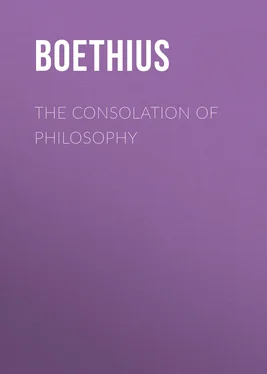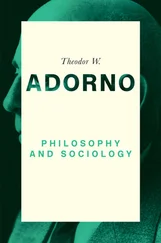Anicius Manlius Severinus Boethius - The Consolation of Philosophy
Здесь есть возможность читать онлайн «Anicius Manlius Severinus Boethius - The Consolation of Philosophy» — ознакомительный отрывок электронной книги совершенно бесплатно, а после прочтения отрывка купить полную версию. В некоторых случаях можно слушать аудио, скачать через торрент в формате fb2 и присутствует краткое содержание. Жанр: foreign_antique, Философия, foreign_edu, на английском языке. Описание произведения, (предисловие) а так же отзывы посетителей доступны на портале библиотеки ЛибКат.
- Название:The Consolation of Philosophy
- Автор:
- Жанр:
- Год:неизвестен
- ISBN:нет данных
- Рейтинг книги:4 / 5. Голосов: 1
-
Избранное:Добавить в избранное
- Отзывы:
-
Ваша оценка:
- 80
- 1
- 2
- 3
- 4
- 5
The Consolation of Philosophy: краткое содержание, описание и аннотация
Предлагаем к чтению аннотацию, описание, краткое содержание или предисловие (зависит от того, что написал сам автор книги «The Consolation of Philosophy»). Если вы не нашли необходимую информацию о книге — напишите в комментариях, мы постараемся отыскать её.
The Consolation of Philosophy — читать онлайн ознакомительный отрывок
Ниже представлен текст книги, разбитый по страницам. Система сохранения места последней прочитанной страницы, позволяет с удобством читать онлайн бесплатно книгу «The Consolation of Philosophy», без необходимости каждый раз заново искать на чём Вы остановились. Поставьте закладку, и сможете в любой момент перейти на страницу, на которой закончили чтение.
Интервал:
Закладка:
BOOK I.
THE SORROWS OF BOETHIUS
Boethius' complaint (Song I.).—CH. I. Philosophy appears to Boethius, drives away the Muses of Poetry, and herself laments (Song II.) the disordered condition of his mind.—CH. II. Boethius is speechless with amazement. Philosophy wipes away the tears that have clouded his eyesight.—CH. III. Boethius recognises his mistress Philosophy. To his wondering inquiries she explains her presence, and recalls to his mind the persecutions to which Philosophy has oftentimes from of old been subjected by an ignorant world. CH. IV. Philosophy bids Boethius declare his griefs. He relates the story of his unjust accusation and ruin. He concludes with a prayer (Song V.) that the moral disorder in human affairs may be set right.—CH. V. Philosophy admits the justice of Boethius' self-vindication, but grieves rather for the unhappy change in his mind. She will first tranquillize his spirit by soothing remedies.—CH. VI. Philosophy tests Boethius' mental state by certain questions, and discovers three chief causes of his soul's sickness: (1) He has forgotten his own true nature; (2) he knows not the end towards which the whole universe tends; (3) he knows not the means by which the world is governed.
BOOK I
SONG I.
Boethius' Complaint
Who wrought my studious numbers
Smoothly once in happier days,
Now perforce in tears and sadness
Learn a mournful strain to raise.
Lo, the Muses, grief-dishevelled,
Guide my pen and voice my woe;
Down their cheeks unfeigned the tear drops
To my sad complainings flow!
These alone in danger's hour
Faithful found, have dared attend
On the footsteps of the exile
To his lonely journey's end.
These that were the pride and pleasure
Of my youth and high estate
Still remain the only solace
Of the old man's mournful fate.
Old? Ah yes; swift, ere I knew it,
By these sorrows on me pressed
Age hath come; lo, Grief hath bid me
Wear the garb that fits her best.
O'er my head untimely sprinkled
These white hairs my woes proclaim,
And the skin hangs loose and shrivelled
On this sorrow-shrunken frame.
Blest is death that intervenes not
In the sweet, sweet years of peace,
But unto the broken-hearted,
When they call him, brings release!
Yet Death passes by the wretched,
Shuts his ear and slumbers deep;
Will not heed the cry of anguish,
Will not close the eyes that weep.
For, while yet inconstant Fortune
Poured her gifts and all was bright,
Death's dark hour had all but whelmed me
In the gloom of endless night.
Now, because misfortune's shadow
Hath o'erclouded that false face,
Cruel Life still halts and lingers,
Though I loathe his weary race.
Friends, why did ye once so lightly
Vaunt me happy among men?
Surely he who so hath fallen
Was not firmly founded then.
I
While I was thus mutely pondering within myself, and recording my sorrowful complainings with my pen, it seemed to me that there appeared above my head a woman of a countenance exceeding venerable. Her eyes were bright as fire, and of a more than human keenness; her complexion was lively, her vigour showed no trace of enfeeblement; and yet her years were right full, and she plainly seemed not of our age and time. Her stature was difficult to judge. At one moment it exceeded not the common height, at another her forehead seemed to strike the sky; and whenever she raised her head higher, she began to pierce within the very heavens, and to baffle the eyes of them that looked upon her. Her garments were of an imperishable fabric, wrought with the finest threads and of the most delicate workmanship; and these, as her own lips afterwards assured me, she had herself woven with her own hands. The beauty of this vesture had been somewhat tarnished by age and neglect, and wore that dingy look which marble contracts from exposure. On the lower-most edge was inwoven the Greek letter Π [Greek: P], on the topmost the letter θ [Greek: Th], 1 1 Π (P) stands for the Political life, the life of action; θ (Th) for the Theoretical life, the life of thought.
and between the two were to be seen steps, like a staircase, from the lower to the upper letter. This robe, moreover, had been torn by the hands of violent persons, who had each snatched away what he could clutch. 2 2 The Stoic, Epicurean, and other philosophical sects, which Boethius regards as heterodox. See also below, ch. iii., p. 14 .
Her right hand held a note-book; in her left she bore a staff. And when she saw the Muses of Poesie standing by my bedside, dictating the words of my lamentations, she was moved awhile to wrath, and her eyes flashed sternly. 'Who,' said she, 'has allowed yon play-acting wantons to approach this sick man—these who, so far from giving medicine to heal his malady, even feed it with sweet poison? These it is who kill the rich crop of reason with the barren thorns of passion, who accustom men's minds to disease, instead of setting them free. Now, were it some common man whom your allurements were seducing, as is usually your way, I should be less indignant. On such a one I should not have spent my pains for naught. But this is one nurtured in the Eleatic and Academic philosophies. Nay, get ye gone, ye sirens, whose sweetness lasteth not; leave him for my muses to tend and heal!' At these words of upbraiding, the whole band, in deepened sadness, with downcast eyes, and blushes that confessed their shame, dolefully left the chamber.
But I, because my sight was dimmed with much weeping, and I could not tell who was this woman of authority so commanding—I was dumfoundered, and, with my gaze fastened on the earth, continued silently to await what she might do next. Then she drew near me and sat on the edge of my couch, and, looking into my face all heavy with grief and fixed in sadness on the ground, she bewailed in these words the disorder of my mind:
SONG II.
His Despondency
Alas! in what abyss his mind
Is plunged, how wildly tossed!
Still, still towards the outer night
She sinks, her true light lost,
As oft as, lashed tumultuously
By earth-born blasts, care's waves rise high.
Yet once he ranged the open heavens,
The sun's bright pathway tracked;
Watched how the cold moon waxed and waned;
Nor rested, till there lacked
To his wide ken no star that steers
Amid the maze of circling spheres.
Интервал:
Закладка:
Похожие книги на «The Consolation of Philosophy»
Представляем Вашему вниманию похожие книги на «The Consolation of Philosophy» списком для выбора. Мы отобрали схожую по названию и смыслу литературу в надежде предоставить читателям больше вариантов отыскать новые, интересные, ещё непрочитанные произведения.
Обсуждение, отзывы о книге «The Consolation of Philosophy» и просто собственные мнения читателей. Оставьте ваши комментарии, напишите, что Вы думаете о произведении, его смысле или главных героях. Укажите что конкретно понравилось, а что нет, и почему Вы так считаете.












